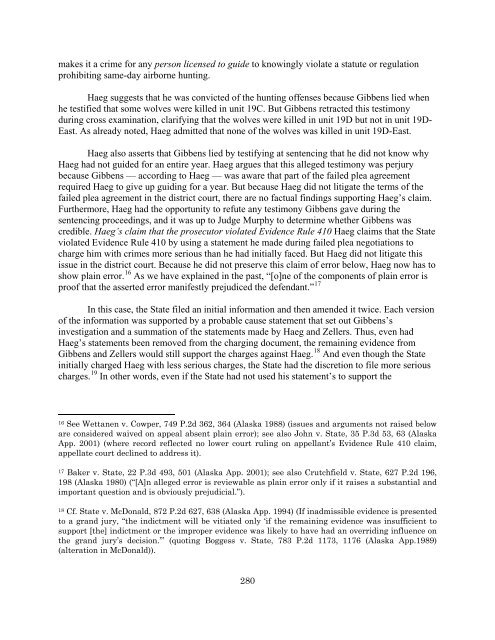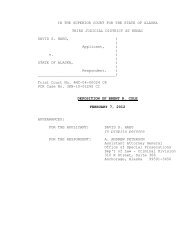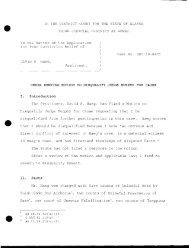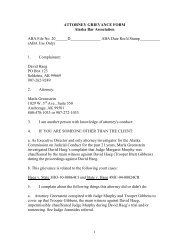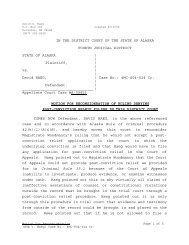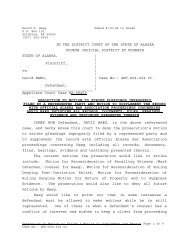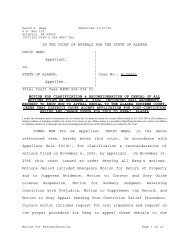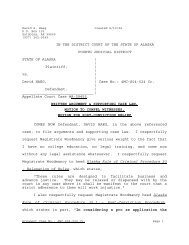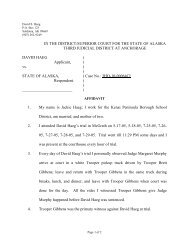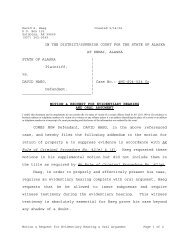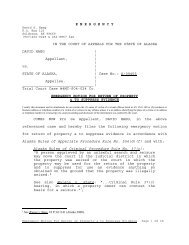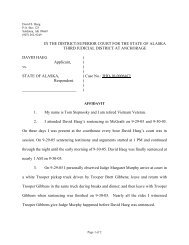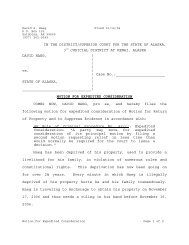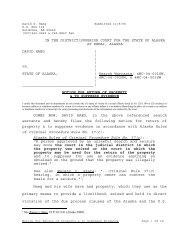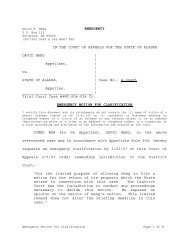PCR Exhibits - Alaska State of Corruption
PCR Exhibits - Alaska State of Corruption
PCR Exhibits - Alaska State of Corruption
You also want an ePaper? Increase the reach of your titles
YUMPU automatically turns print PDFs into web optimized ePapers that Google loves.
makes it a crime for any person licensed to guide to knowingly violate a statute or regulation<br />
prohibiting same-day airborne hunting.<br />
Haeg suggests that he was convicted <strong>of</strong> the hunting <strong>of</strong>fenses because Gibbens lied when<br />
he testified that some wolves were killed in unit 19C. But Gibbens retracted this testimony<br />
during cross examination, clarifying that the wolves were killed in unit 19D but not in unit 19D-<br />
East. As already noted, Haeg admitted that none <strong>of</strong> the wolves was killed in unit 19D-East.<br />
Haeg also asserts that Gibbens lied by testifying at sentencing that he did not know why<br />
Haeg had not guided for an entire year. Haeg argues that this alleged testimony was perjury<br />
because Gibbens — according to Haeg — was aware that part <strong>of</strong> the failed plea agreement<br />
required Haeg to give up guiding for a year. But because Haeg did not litigate the terms <strong>of</strong> the<br />
failed plea agreement in the district court, there are no factual findings supporting Haeg’s claim.<br />
Furthermore, Haeg had the opportunity to refute any testimony Gibbens gave during the<br />
sentencing proceedings, and it was up to Judge Murphy to determine whether Gibbens was<br />
credible. Haeg’s claim that the prosecutor violated Evidence Rule 410 Haeg claims that the <strong>State</strong><br />
violated Evidence Rule 410 by using a statement he made during failed plea negotiations to<br />
charge him with crimes more serious than he had initially faced. But Haeg did not litigate this<br />
issue in the district court. Because he did not preserve this claim <strong>of</strong> error below, Haeg now has to<br />
show plain error. 16 As we have explained in the past, “[o]ne <strong>of</strong> the components <strong>of</strong> plain error is<br />
pro<strong>of</strong> that the asserted error manifestly prejudiced the defendant.” 17<br />
In this case, the <strong>State</strong> filed an initial information and then amended it twice. Each version<br />
<strong>of</strong> the information was supported by a probable cause statement that set out Gibbens’s<br />
investigation and a summation <strong>of</strong> the statements made by Haeg and Zellers. Thus, even had<br />
Haeg’s statements been removed from the charging document, the remaining evidence from<br />
Gibbens and Zellers would still support the charges against Haeg. 18 And even though the <strong>State</strong><br />
initially charged Haeg with less serious charges, the <strong>State</strong> had the discretion to file more serious<br />
charges. 19 In other words, even if the <strong>State</strong> had not used his statement’s to support the<br />
16 See Wettanen v. Cowper, 749 P.2d 362, 364 (<strong>Alaska</strong> 1988) (issues and arguments not raised below<br />
are considered waived on appeal absent plain error); see also John v. <strong>State</strong>, 35 P.3d 53, 63 (<strong>Alaska</strong><br />
App. 2001) (where record reflected no lower court ruling on appellant’s Evidence Rule 410 claim,<br />
appellate court declined to address it).<br />
17 Baker v. <strong>State</strong>, 22 P.3d 493, 501 (<strong>Alaska</strong> App. 2001); see also Crutchfield v. <strong>State</strong>, 627 P.2d 196,<br />
198 (<strong>Alaska</strong> 1980) (“[A]n alleged error is reviewable as plain error only if it raises a substantial and<br />
important question and is obviously prejudicial.”).<br />
18 Cf. <strong>State</strong> v. McDonald, 872 P.2d 627, 638 (<strong>Alaska</strong> App. 1994) (If inadmissible evidence is presented<br />
to a grand jury, “the indictment will be vitiated only ‘if the remaining evidence was insufficient to<br />
support [the] indictment or the improper evidence was likely to have had an overriding influence on<br />
the grand jury’s decision.’” (quoting Boggess v. <strong>State</strong>, 783 P.2d 1173, 1176 (<strong>Alaska</strong> App.1989)<br />
(alteration in McDonald)).<br />
280


